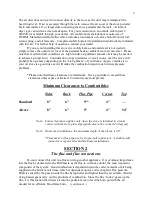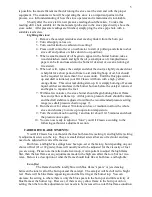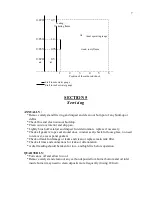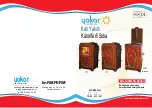
The air duct does not need to connect directly to the stove as the duct may terminate at the
hearth top level. If air is accessed through the wall, remove the air cover at the stove pedestal
back, and install a 4” or larger duct connecting the stove pedestal and the wall. A storm or
dryer type vent with a screen is adequate. For your convenience, an outside air kit (part #
4OAVK) is available through your dealer. All mobile home installations require use of
OCHM1 Manufactured Home Kit which includes an automatic oil valve shut-off control rod,
return spring, and all fasteners. Complete mobile home kit installation instructions are included
with this kit. For further help or questions, contact your dealer.
If you are not installing this stove in a mobile home, and outside air is not desired,
simply remove the outside air cover at the pedestal back so ambient room air can enter. Please
note that at certain draft conditions (i.e. high winds) a significant amount of air may be needed
to achieve a proper burn. Consideration of open windows or an air source near the stove will
probably be necessary depending on the “air-tightness” of your home. Again, outside air to
your oil stove is a good idea as it will make the combustion impervious to house pressure
problems.
*Please note that these clearances are minimums. It is a good idea to exceed these
clearances unless space is limited. Common sense must prevail.
Minimum Clearances to Combustibles
Sides
Back Flue Pipe
Corner
Top
Standard
8”
6”
9”*
4”
—
Alcove
8”
6”
9”
4”
54”
Note: Corner clearance applies only when the stove is installed in a room
corner with the stove placed perpendicular to the corner (45 degrees).
Note: On alcove installations, the maximum depth of the alcove is 30”.
*Clearances to flue pipe are for single-wall connectors. A double-wall
connector is required for mobile home installations.
SECTION 2
The flue and flue connections
Do not connect this unit to a flue servicing another appliance. It is of utmost importance
that the flue be dedicated to the Oil Classic as the flue is, without a doubt, the most important
component of the system. Good combustion is dependent upon the correct amount of air being
supplied to the burner at all times, which is dependent upon a correct negative flue pressure.
Draft is caused by the gases inside the flue being hotter and lighter than the air outside, thus the
rising heated gases carry out the products of combustion. Since the flue “sucks” gases up the
flue, it is this suction that draws air into the pedestal area to feed the burn pot with the air
needed for an efficient, blue-flame burn.
(continued…)
2





























